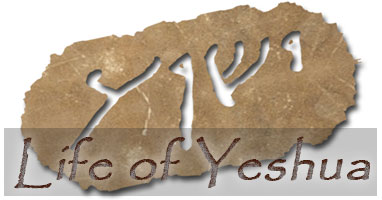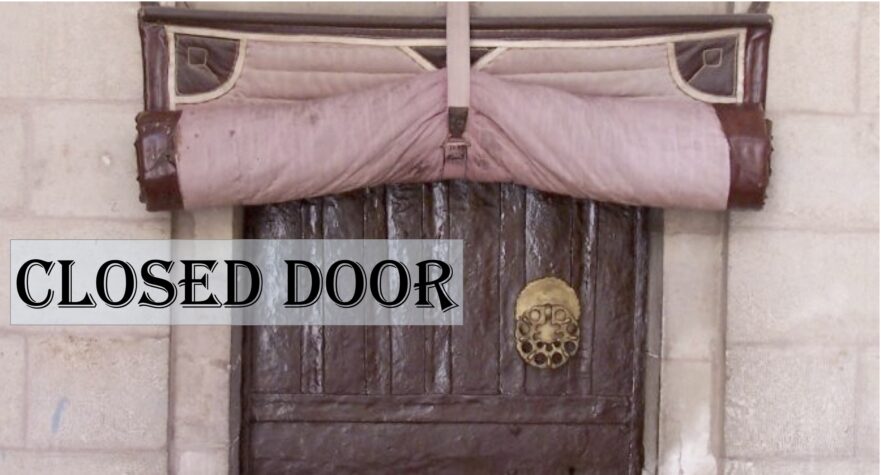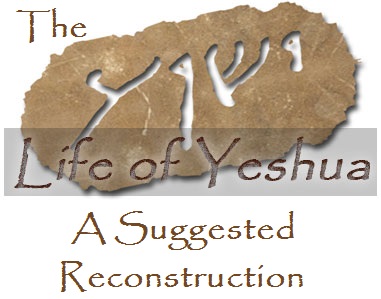How to cite this article:
Joshua N. Tilton and David N. Bivin, “Closed Door,” The Life of Yeshua: A Suggested Reconstruction (Jerusalem Perspective, 2024) [https://www.jerusalemperspective.com/28488/].
(Matt. 7:22-23; Luke 13:25-27)
(Huck 42, 165, 227; Aland 74, 211, 289;
Crook 57, 248, 304)[1]
מִשֶּׁיָּקוּם בַּעַל הַבַּיִת וְיִנְעוֹל אֶת הַדֶּלֶת תַּתְחִילוּ לַעֲמוֹד בַּחוּץ וְלִדְפּוֹק עַל הַדֶּלֶת לוֹמַר אֲדוֹנֵנוּ פְּתַח לָנוּ וְיַעֲנֶה וְיֹאמַר לָכֶם לֹא יָדַעְתִּי אֶתְכֶם מִנַּיִין אַתֶּם וְתַתְחִילוּ לוֹמַר אָכַלְנוּ לְפָנֶיךָ וְשָׁתִינוּ וּבִרְחֹבֹתֵינוּ לִמַּדְתָּנוּ וְיֹאמַר לָכֶם לוֹמַר לֹא יָדַעְתִּי מִנַּיִין אַתֶּם סוּרוּ מִמֶּנִּי כָּל פֹּעֲלֵי אָוֶן
“From the time when the householder rises and locks the door, you will find yourselves standing outside, and you’ll start knocking on the door saying, ‘Our lord! Open up! Let us in!’ But he will answer in reply, ‘I don’t know you. Where are you from?’ And you’ll start explaining, ‘We ate and drank with you! You taught us in our streets!’ But he will say, ‘No. I don’t know where you’re from. Away with all you ne’er-do-wells!’[2]
| Table of Contents |
|
3. Conjectured Stages of Transmission 5. Comment 8. Conclusion |
Reconstruction
To view the reconstructed text of Closed Door click on the link below:
Paid Content
Premium Members and Friends of JP must be logged in to access this content: Login
If you do not have a paid subscription, please consider registering as a Premium Member starting at $10/month (paid monthly) or only $5/month (paid annually): Register
One Time Purchase Rather Than Membership
Rather than purchasing a membership subscription, you may purchase access to this single page for $1.99 USD. To purchase access we strongly encourage users to first register for a free account with JP (Register), which will make the process of accessing your purchase much simpler. Once you have registered you may login and purchase access to this page at this link:
Conclusion
In Closed Door Jesus brought home the message of the Great Banquet parable to his audience by rhetorically bringing them inside the imaginary world of the parable. The invited guests of the Great Banquet parable become the “you” of Closed Door, the people who stand outside knocking and begging for admittance.
As we stated above, this shift from the imaginary world of the parable to the “real” world of Jesus’ audience reminds us of how the prophet Nathan, after telling King David a parable about how a rich man stole a beloved sheep from a poor neighbor, declared to King David, “You are the man!”
The point Jesus made in Closed Door is that Jesus’ audience had been invited to take part in the Kingdom of Heaven by showing radical hospitality to the poor, but through their skeptical attitudes and preoccupation with their own wealth and status they were in danger of turning down that invitation. Unless they changed their ways, they would find themselves shut out of the Kingdom of Heaven.
 Click here to return to The Life of Yeshua: A Suggested Reconstruction main page.
_______________________________________________________
Click here to return to The Life of Yeshua: A Suggested Reconstruction main page.
_______________________________________________________
- [1] For abbreviations and bibliographical references, see “Introduction to ‘The Life of Yeshua: A Suggested Reconstruction.’” ↩
- [2] This translation is a dynamic rendition of our reconstruction of the conjectured Hebrew source that stands behind the Greek of the Synoptic Gospels. It is not a translation of the Greek text of a canonical source. ↩

































































































